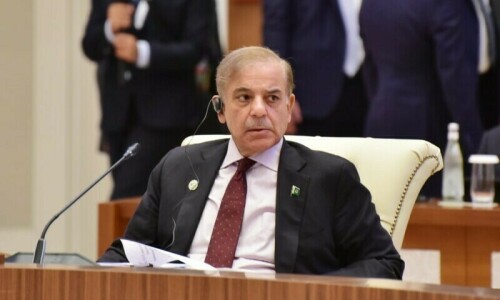Shamim-ur-Rahman
KARACHI, March 27: John D. Negroponte, the US Deputy Secretary of State, said on Thursday it was for Pakistan’s political process to determine the future of President Pervez Musharraf, but hinted at serious concerns over the new government’s intent to open dialogue with the militant leaders in tribal areas.
In reply to a question at a news conference whether he had come to Pakistan to “rescue” Pervez Musharraf at a time when the demand for his resignation and impeachment was growing, Mr Negroponte surprised many by not reaffirming support for the president.
His response was lukewarm: “He is of course president of the country.”
“Any debate ... with regard to the issue of his status is something that will have to be addressed by the internal Pakistani political process. We will certainly respect whatever is decided in that regard,” said Mr Negroponte.
In reply to a question whether the US was feeling uncomfortable with the new government’s plan to open negotiations with militants in tribal areas,
Mr Negroponte said he did not see how it would be possible to hold discussions with some “irreconcilable” militants.
“I don’t think you can talk to irreconcilable elements. There can be talks with reconcilable elements,” he said, calling for tackling the threat in a “mutually agreeable way”.
The US diplomat said he was confident that some hardliners could be persuaded to participate in the democratic process. But he did not define “irreconcilable” and “reconcilable” elements.
He was evasive when asked whether it meant that his side had conveyed Washington’s objections to open negotiations with militant elements.
’’We want to deal with militancy in a mutually beneficial way on the basis of partnership with Pakistan through security and economic development, and not unilateral measures. A multi-faceted approach is needed to deal with extremism. However, reconcilable elements can be dealt with in a democratic way.
“Nations act in their own interest and we do not find it surprising,” Mr Negroponte stressed in reply to a question.The United States, he added, was committed to working with all of Pakistan’s leaders on full spectrum of bilateral issues, from fighting “violent extremism to improving educational and economic opportunities’’.
When his attention was drawn to statements by certain politicians calling his visit “unwanted”, Mr Negroponte said the visit was aimed at extending support to the new government and there was no hidden agenda or desire to interfere in Pakistan’s “political arrangements”.
Earlier, in a written statement Mr Negroponte said: “We all recognise that this is an important time in Pakistan’s history as a new parliament begins setting the legislative agenda and a new government starts to take shape.”
Mr Negroponte said US-Pakistan partnership remained strong and that “we envision a continued close, productive alliance that benefits both countries”.
He recalled his meetings with tribal leaders in Peshawar and Landi Kotal on Wednesday in which “we discussed the security and development aspects of our relationship”.













































Dear visitor, the comments section is undergoing an overhaul and will return soon.